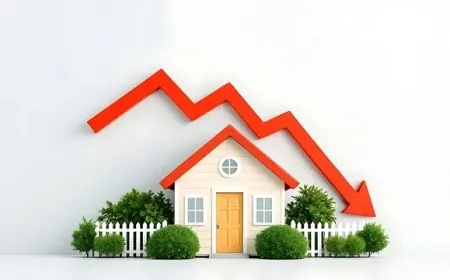Denmark's Approach Could Fix America's Housing Market Issues
Denmark's housing finance system offers a solution to the US lock-in effect, freeing homeowners trapped by rising mortgage rates. Here's how it works.

Millions of Americans are stuck in their homes due to rising mortgage rates, creating a slowdown in the housing market known as the lock-in effect. Denmark’s unique mortgage system, which uses covered bonds, offers a potential solution. This system allows homeowners to move without losing out financially when interest rates rise. Adopting a similar approach in the US could help alleviate the lock-in effect and revitalize the housing market.
Rising Mortgage Rates Trap American Homeowners
Many Americans are stuck in their homes because mortgage rates have gone up. Most people in the US have 30-year fixed-rate mortgages, which means they pay the same amount every month, no matter what happens with the economy. These loans provide stability but also create problems when rates increase. Homeowners don’t want to move because they don’t want to lose their low rates, which slows down the housing market. This situation, called the lock-in effect, makes it hard for new buyers to find homes and keeps current homeowners in places that might not be right for them.
The Lock-In Effect: A Growing Problem
Experts have known about the lock-in effect for a long time. John Campbell, an economist from Harvard, says we didn’t address this issue when we had the chance. More than a million Americans couldn’t sell their homes in just a year and a half because of this effect. However, Denmark might have a solution.
Denmark's Unique Housing Finance System
Denmark also has 30-year fixed-rate mortgages, but they work differently. Danish homeowners can sell their homes without being hurt by higher rates because of something called covered bonds. When a Danish bank gives out a mortgage, it also creates bonds for investors. The value of these bonds changes with the market, which can make it cheaper for homeowners to pay off their mortgages if rates go up. This means Danish homeowners aren’t stuck with their low rates when they want to move.
Challenges of Adopting the Danish Model in the US
In the US, homeowners must pay off the entire mortgage balance, no matter what’s happening in the market. Changing to the Danish system in the US would require big changes to our mortgage market and rules. But if we do nothing, we could face long-term problems in the housing market.
Impact of Rising Rates in the US
During the pandemic, mortgage rates in the US were very low, making home loans cheap. But when the Federal Reserve raised rates to fight inflation, mortgage rates jumped to nearly 8% in late 2022. This big increase has locked many homeowners into their low rates, stopping them from moving. A study by the Federal Housing Finance Agency found that the lock-in effect stopped 1.3 million home sales between mid-2022 and the end of 2023.
Broader Effects on the Housing Market
The lock-in effect affects the whole housing market. Fewer homes for sale mean higher prices and fewer choices for buyers, especially first-time and low-income buyers. It also means people can’t move to find better jobs or homes that suit them better. While other countries like Canada, the UK, and Australia have mortgage systems that adjust rates over time, Denmark’s system is different.
Benefits of the Danish System
Denmark’s covered bonds let homeowners pay off mortgages based on market value, not just the loan balance. Bringing a similar system to the US would be hard but might help avoid long-term issues in the housing market. The Danish system gives homeowners a cushion when rates rise and includes other protections, like letting buyers take over existing low-rate loans. This setup eliminates the lock-in effect and keeps the housing market more active.
Also Read: U.S. New Home Sales Decline in April, Prices Rise Compared to Last Year





























































